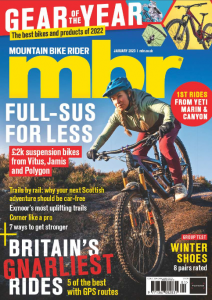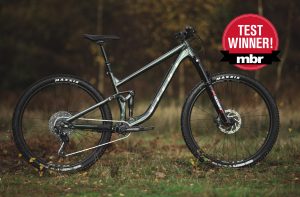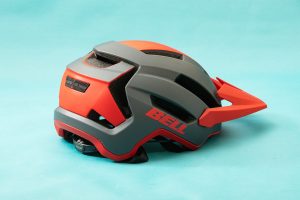The best cross-country (XC) mountain bikes are all about raw speed. But their light weight and excellent efficiency also makes then ideal for fast, flowing singletrack as well as racing.
Welcome to a lean, mean collection of the best cross-country mountain bikes built for speed and put through their (race) paces as chosen by our expert team of reviewers. While all these bikes bring distinctively different approaches to what makes an XC race winner, there is a thread that ties them all together: all are rolling on 29in wheels. Time to don the Lycra and remove our helmet peaks to find out which one really is the fastest.
In many ways, XC racing is the foundation upon which our sport has been built. Yes, new styles and disciplines come and go, or morph in the way that 160mm-travel all-mountain bikes transformed into enduro rigs. Cross-country racing, however, has weathered the storms of fashion and remains ingrained in riding culture to this day, and with the success of the Olympics and stars such as Evie Richards, Tom Pidcock and Mathieu van der Poel now couldn’t be a better time to try one of these addictively fast machines. If you want something more versatile, check out our buyer’s guide to the best down-country bikes as these bring a little bit more suspension travel and allow you to broaden your riding horizons.
Like all survivors, XC racing has prospered by evolving. Long gone are the three-hour mud-fests on non-challenging terrain. Courses are now shorter and more demanding, challenging riders and equipment, while pushing the visual aspect to make it more appealing for spectators.
A typical XC race loop now features punchy climbs, descents worthy of any EWS stage plus more purpose-built features for the TV cameras. XC riding and racing is thrilling to watch because it is no longer purely a test of raw fitness; it’s about pushing skill levels and bike handling as much as heart rates.
Best cross-country mountain bikes: hardtails

Trek Procaliber 9.6
Trek Procaliber
21st century soft-tail with amazing acceleration
Frame: OCLV Mountain Carbon | Weight: 11.01kg (24.23lb) | Rating: 10/10
Pros: Comfortable as well as speedy
Cons: Lacks a dropper post for modern XC courses
We tested the Trek Procaliber 9.7 a couple of years ago and it blew the competition away to take the top step of the podium in our grouptest, and the current model uses the same OCLV carbon frame with effective, trail-smoothing IsoSpeed decoupler. When we tested it we were blown away, writing: ‘From the first pedal stroke the Procaliber took the lead in this test and never faltered. We were instantly won over by its effortless turn of speed, in part thanks to the carbon wheels, but it’s also about the more forgiving ride quality of the frame. Bumps just didn’t chip away at our speed as much as they did on the other bikes on test. And even when we were out of the saddle, the Procaliber was still the smoothest bike here.’
Read our full test review of the Trek Procaliber 9.7

Scott Scale 940
Scott Scale
Not many bikes can boast a stronger World Cup XC heritage
Frame: Scale 3 Carbon | Weight: 11.47kg (25,29lb) | Rating: 9/10
Pros: A rapid all-rounder without any weak links
Cons: Redundant front mech apparatus spoils the aesthetic
Some brands use race teams for marketing, others focus on product development; Scott clearly does both. As such, the Scale is a finely tuned XC race machine with a huge trophy cabinet to prove it. When efficiency matters, the Scale transforms every watt of available energy directly into speed. Whether that’s grinding up a climb with your nose glued to the stem, exiting a corner, or simply changing gear. And direct power delivery isn’t the Scale’s only trump card, it’s equally adept at turning its hand to even the most technical trails.
Read our full test review of the Scott Scale 920

Specialized S-Works Epic HT
Specialized S-Works Epic HT AXS
For the uncompromising XC racer with deep (Lycra) pockets
Frame: S-Works FACT 12m Carbon | Weight: N/A | Rating: N/A
Pros: Power delivery that doesn’t beat you death
Cons: Cutting edge costs money
Imagine our surprise when we discovered that the new Epic HT wasn’t some nervy, neurotic race bike that you need all you wits about you just to navigate a straightforward trail. Sure it’s crazy light; the frame alone weighing 790g. And let’s pause to think about that for a minute. That makes the S-Works Epic frame lighter than the average thin-walled trail tyre. More impressive still, the frame used for the Expert, Pro and regular Epic is only 140g heavier. The fact it is also incredibly light, supremely capable and surprisingly comfortable make it a truly amazing XC hardtail.
Read our full test review of the Specialized Epic HT

Yeti ARC T1
Yeti ARC T1
Channels the spirit of ’90s XC legends like Furtado and Tomac
Frame: Yeti TURQ Series Carbon | Weight: 11.38kg (25,11lb) | Rating: N/A
Pros: It’s hard not to feel special when you sling a leg over the iconic ARC
Cons: Not really a pure cross-country race rig with its 130mm fork
Bear with us here. We know this isn’t really a XC race hardtail, but for some riders (of a certain age maybe) the Yeti ARC will be the bike that gets them around the XC race course the quickest. This is purely an emotional attribute. You can feel John Tomac and Julie Furtado watching you as you pilot this blue baby along the trails. What exactly is this bike for? Truth be told, it has no logical place. Which is why we love it. If push came to shove we’d call it a dreamy Down Country hardtail.
Read our full test review of the Yeti ARC T1
Best cross-country mountain bikes: full-suspension

Vitus Rapide FS CRX
Vitus Rapide FS CRX
Bargain speed machine
Frame: UD Carbon | Weight: 11.34kg (25lb) | Rating: 10/10
Pros: Rapid up and down. Typical Vitus value.
Cons: Only one bottle mount.
The Vitus Rapide is a pure XC race bike, just not in the traditional sense. Yes, it’s got 100mm travel and the full carbon frame weighs only 2,080g, but take a closer look at the rest of its vital stats and you’ll instantly see that the Rapide FS is heavily influenced by the progression of modern trail bike geometry. It’s competitively light given the price, and if Vitus was to release an AMP version, it would easily seek in under the 11kg threshold. It’s also a blisteringly fast bike and not just in a straight line. The modern geometry and generous sizing allow you to attack harder or recover more easily on the descents, but the Rapide still climbs and sprints with the best of them, thanks to its stable but supple suspension so going fast has never been as much fun.
Read our full review of the Vitus Rapide FS CRX

Specialized Epic Evo
Specialized Epic Evo
Dialled option from the Big ‘S’
Frame: FACT 11m Carbon | Weight: 10.70g (23.59lb) | Rating: 8/10
Pros: Ditching the chainstay pivot has only improved its speed. No more Brain makes suspension set-up easier.
Cons: Seat tube lengths are still more in tune with road bikes than modern trail bikes
The Epic Evo takes the quintessential XC bike and puts it through boot camp to emerge faster and more capable than ever. There’s an extra 20mm travel up front compared to the Epic, which helps slacken the razor-sharp steering to make it less twitchy at high speeds. At the back there’s 10mm more travel, which helps with comfort and traction. The carbon frame is sleek with a classic shape and an excellent choice of sizes, so you can be sure to get the right fit. You’ll need tighter reins compared to a true down-country bike, but the Epic Evo is more than capable of winning on Sunday, shredding on Monday.
Read our full test review of the Specialized Epic Comp Evo

Scott Spark RC WC AXS
Scott Spark
Ruthless in its efficiency
Frame: RC Carbon HMX, 0/80/120mm | Weight: 11.12kg (24.52lb) | Rating: 9/10
Pros: Super clean lines reflect the bike’s rapidity.
Cons: Suspension could be a touch more supple in Descend mode.
Fast, efficient and responsive, the new Scott Spark RC is an outstanding XC race bike. With 120mm of travel, it has the suspension to tackle the toughest courses, but reserves a sharpness to its pedaling response that won’t leave you languishing in the finish-line sprint. It’s stiff too, so if you’re not under 65kg dripping wet, you’ll still have the confidence to charge hard. Scott has missed a trick with it’s TwinLoc remote though, as we think the Spark RC would be even faster if the suspension was a touch more active in the 120mm Descend mode. Even so, this is a scorchingly fast XC bike with a helluva pedigree that can still hold its own in the right hands against most modern trail bikes on gnarlier terrain.
Read our full test review of the Scott Spark RC WC AXS

Santa Cruz Blur XC CC X01 AXS RSV
Santa Cruz Blur
Punches well above its weight
Frame: CC carbon, 100mm | Weight: 10.41kg (22.95lb) | Rating: 8/10
Pros: So light it barely needs any human propulsion.
Cons: Rear suspension is not the firmest under power.
This is no average XC race bike. Yes, the Blur XC is light, only has 100mm travel and all of the components have been selected with durability and compatibility in mind. Stand up to sprint and it’s tight and reactive. Bomb down the descents and it’s remarkably composed. Spin along the flat or grind up a climb, however, and the rear suspension is, how do we put this, overly active. So unless you use the remote lockout, the Blur XC feels slightly laboured on the climbs. It’s the bike’s only shortcoming. But in XC racing, you can’t afford to show any weakness. If you’re not racing however and just want a fast bike for trails…
Read our full test review of the Santa Cruz Blur XC CC X01 AXS RSV

We had to borrow Lycra from our sister publication for this test
Best cross-country mountain bikes: hardtail advice
We love hardtails at mbr. XC race bikes have never been in a better spot, the bikes rising to the challenge of modern courses and the demands of the next generation of racers.
And while most of the racing elite have smoothly transitioned to 29er full-suspension bikes, if you’re just getting into XC racing, a trusty 29er hardtail is a much more affordable way to get your hands on a lightweight, efficient bike. Which is why we have XC 29er race hardtails lined up on the grid for this test.
Here we have bikes cut from exact same cloth — probably Lycra — and all designed with one goal in mind: getting to the finish line first. We’ll want to see which of these bikes offers the best power delivery without leaving you battered or broken. And to uncover which bikes can handle technical terrain when your legs and brain are both starved of oxygen, we’ll be razzing around the woods in an ultra-fatigued state to replicate the intensity of racing.

You can still wear baggy shorts on crosscountry rides
Best cross-country mountain bikes: full-suspension advice
As XC courses have evolved, so too have the bikes. As such, modern XC races will probably see very few races won on a hardtail, with lightweight full-suspension bikes proving to be the most efficient over the majority of race courses. Even at the highest level of World Cup racing, the pros have realised that effective suspension and confidence-inspiring geometry can bring bigger gains than just weight saving and efficiency alone.
So for most riders, a full-suspension XC bike will reduce fatigue on a modern race course, allowing you to use that saved energy to attack the competition. And when you’re not between the tape, a full-sus race bike can also hold its own as a trail bike, giving extra versatility.
However, if you’re toying with trying a few XC races, but also fancy the idea of a gravel bike, an XC hardtail would make a better tool. Why? Well, they’re likely to be just as fast as a gravel bike on most actual gravel roads, but with the right cockpit and geometry for bombing off-piste when the opportunity arises. And who wants to spend their life grovelling along a gravel road when you could be ripping some prime singletrack?


















